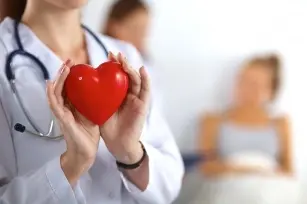
The heart is a life-giving blood pump that is very easy to neglect. We often unconsciously contribute to heart problems – we live in stress, too fast, we prefer a sedentary lifestyle and we do not eat properly. Disturbing changes in this organ will also signal us to other parts of our body. Here are a few symptoms, the observation of which will allow you to understand in time that something is wrong and you need to go to a cardiologist.
- Stinging and pain in the chest area. Stinging, short pain, quite often occurring around the sternum, is one of the symptoms that are most often reported to doctors. This sensation – squeezing, tearing, burning – is also often accompanied by shortness of breath or increased body temperature. Usually the pain radiates to the arm, throat or left shoulder, back, neck. This type of pain is often indicative of sacculitis, pericarditis, or pleurisy. It also appears in ischemic heart disease. It often occurs with physical exertion, such as walking or climbing stairs.
- Fatigue and headaches. Constant fatigue is a symptom of many ailments (overweight, overwork, poor physical condition), but when it lasts too long and other causes are excluded, the likelihood of heart problems should also be considered. Such a signal may also be headaches in the morning after waking up (high blood pressure), which increases the risk of a heart attack or stroke, and dizziness after getting up suddenly is associated with a drop in blood pressure, or may mean heart failure and arrhythmia.
- Breathlessness attacks. Especially the one that occurs with minimal physical effort, e.g. when climbing the stairs to a fairly low floor or while cleaning, may mean hypoxia of the body. Disturbances in pumping blood by the heart contribute to insufficient ventilation of the lungs. Wheezing coming from the chest and a dry cough are common with attacks of shortness of breath. What’s more, a prolonged cough without a cold or allergy can also signal heart problems!
- Palpitations. In any form – beating too fast, irregular, slowed down. In any case of heart palpitations, it is necessary to visit a cardiologist. Cardiac arrhythmia occurs in serious diseases such as ischemic disease, valve defects, hyperthyroidism or hypertension.
- Bruises, a bluish tint to the skin. Bruising of the skin and mucous membranes occurs naturally in some people, e.g. under the eyes as a result of fatigue or is part of their type of beauty. However, if you have only recently noticed a bluish tint in certain areas of your skin, it may mean acquired and congenital heart disease, phlebitis, circulatory failure or atherosclerosis.









